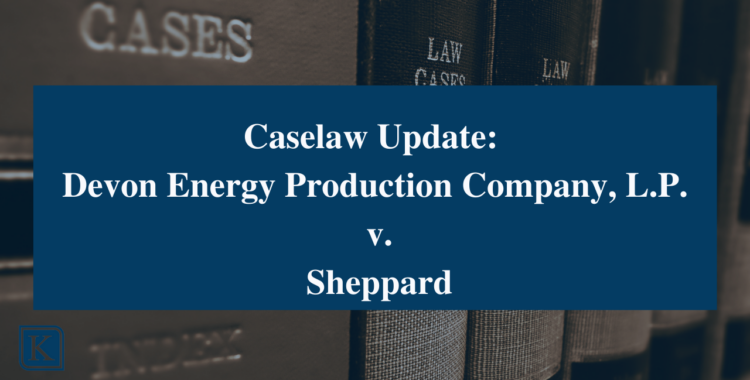Caselaw Update: Devon Energy Production Company, L.P. v. Sheppard
In Devon v. Sheppard, the Supreme Court of Texas recently addressed a highly unique issue concerning the calculation of oil and gas royalties. More specifically, the Court addressed whether lease language dictated that a Landowner’s royalty payments should be based not only on gross proceeds, but also on a third-party buyer’s postproduction costs that accrue or are anticipated after the point of sale. The Court held that that such costs must be added to the producers’ gross proceeds when the sales contract specifies that they were deducted from the sales using published index prices downstream from the point of sale.
Historically, lessors receive royalties without deductions for costs incurred bringing the minerals to the surface. However, royalties may be reduced by postproduction costs incurred to make the oil and gas marketable (i.e., transporting, compressing, and refining the raw minerals). While lessors generally prefer to receive the enhanced value of the production at no extra cost, this shifts the burden of postproduction costs entirely to the producer. Not all producers process and/or transport their own hydrocarbons, and when negotiating a sale, the sales price is generally lowered when a third-party buyer handles the processing and transportation. An average “gross-proceeds” contract requires the producer to add these pre-sale deductions, determined at specified downstream valuation points, back to the actual price received before calculating the lessor’s royalty—because the processing and transportation benefits the producer. It is not uncommon for lessors and producers to negotiate provisions governing royalty calculation and the allocation of production expenses to suit their individual needs, which has all too often led to litigation due to differing interpretations of lease language.
The mineral leases at issue in Devon v. Sheppard were drafted by respondents and lessors, Sheppard (2007) and Crain (2010, 2011), and covered interest in the Eagle Ford Shale. The leases required royalty payments on gross proceeds of sale without deduction of post-production costs. The leases also contained an “add-back or add-to-proceeds” provision governing royalty calculation that provided as follows: if “any reduction or charge for the [postproduction] expenses or costs” has been “include[d]” in “any disposition, contract or sale” of production, these amounts “shall be added to the . . . gross proceeds so that [the landowner’s] royalty shall never be chargeable directly or indirectly with any costs or expenses other than its pro rata share of severance or production taxes.” This unusual language raised the question of “contractual intent to include in the royalty base post-sale postproduction costs that were not part of the producers’ gross sales proceeds.”
A dispute concerning royalty payments arose when the landowners discovered the producers under the Sheppard lease had been selling oil, not yet in marketable form, based on contracts that set sales prices using index prices for more refined products at markets downstream from the point of sale and then subtracted an additional $18 per barrel for “gathering and handling, inclusive of rail car transportation.” The producers then used a “net back” method to the first point of sale to set a value based on the indexed prices. The landowners further learned that the producers had participated in other transactions that similarly adjusted the sales prices downward which were occasionally identified as “accounting for the buyer’s actual or anticipated post-sale post-production costs.” The producers never included any of these downward cost adjustments in the landowners’ royalty calculations, because they did not believe these adjustments inured to their benefit. The landowners thought otherwise because the language of their leases required royalty
to be paid on additional sums deducted, and that these post-sale expenses should have been added to the producers’ gross proceeds before royalty was calculated. The landowners then filed suit and sought damages for breach of contract.
The lower courts agreed with Sheppard on the breach of contract claim, and the producers filed a petition for review with the Texas Supreme Court. The Court agreed with the lower court rulings and found that the unique lease language in question created “proceeds-plus” leases. “Proceeds-plus” leases require a two-prong calculation of the royalty base: first, the producers must determine gross proceeds free of post-production costs, and then, when the enumerated post-production costs in the contract are deducted in setting the sales price, those enumerated costs shall be added to the gross proceeds. The Court held that this calculation was in harmony with the “intent and expectation” of the novel lease language, but stipulated that this ruling was specific to the language in these unique leases. To prevent lessors from claiming an additional royalty at any and every post-sale point, the Court referenced Paragraph 3 of the subject lease and stated that the royalty obligation shall be contractually tethered to the “time and place where gross proceeds are [initially] realized.”
When producers seek to deduct postproduction costs from a landowner’s royalty, it is important to first determine if the lease in question is a “proceeds-plus” lease. If so, it is now legally reasonable to conclude that the parties intended the lease to depart from “the usual rules by freeing the landowner’s royalty from at least some [additional, non-industry standard] postproduction costs.” If the lease is a “proceeds-plus” lease, and the producer has no intention of incurring the entire burden of post-production cost, the usage of this language is of the utmost importance. When “there is nothing common, usual, or standard about the language in [a lease]” courts will construe that as evidence of each party clearly “expressing the intent to deviate from the usual expectations regarding the allocation of post-production costs.” The lease at issue in Devon v. Sheppard was executed near the beginning of the Eagle Ford Shale boom, making it likely that many variations of this lease, with similar royalty language, are presently in effect.
Kuiper Law Firm, PLLC specializes in oil and gas issues; if you have any questions about how the information in this article may apply to you or your operations, do not hesitate to contact us.

